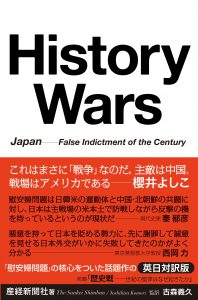House Resolution 121 (H.Res.121) is a U.S. congressional resolution “expressing the sense of the House of Representatives that the Government of Japan should formally acknowledge, apologize, and accept historical responsibility in a clear and unequivocal manner for its Imperial Armed Forces’ coercion of young women into sexual slavery, known to the world as ‘comfort women’, during its colonial and wartime occupation of Asia and the Pacific Islands from the 1930s through the duration of World War II.”
H.Res.121 was introduced by Rep. Mike Honda, a Japanese American from California who spent his early years in a concentration camp with his family under President Roosevelt’s executive order 9066, and co-sponsored by 167 members of the Congress.
Similar resolutions had been proposed in the past, including in 2006, but were not voted on. In 2007, a series of controversial statements by Japanese Prime Minister Shinzo Abe as well as the publication of a comfort women denial ad The Facts (2007) in The Washington Post propelled the resolution into passage.
Text of the H.Res.121 follows:
Whereas the Government of Japan, during its colonial and wartime occupation of Asia and the Pacific Islands from the 1930s through the duration of World War II, officially commissioned the acquisition of young women for the sole purpose of sexual servitude to its Imperial Armed Forces, who became known to the world as ianfu or comfort women;
Whereas the comfort women system of forced military prostitution by the Government of Japan, considered unprecedented in its cruelty and magnitude, included gang rape, forced abortions, humiliation, and sexual violence resulting in mutilation, death, or eventual suicide in one of the largest cases of human trafficking in the 20th century;
Whereas some new textbooks used in Japanese schools seek to downplay the comfort women tragedy and other Japanese war crimes during World War II;
Whereas Japanese public and private officials have recently expressed a desire to dilute or rescind the 1993 statement by Chief Cabinet Secretary Yohei Kono on the comfort women, which expressed the Government’s sincere apologies and remorse for their ordeal;
Whereas the Government of Japan did sign the 1921 International Convention for the Suppression of the Traffic in Women and Children and supported the 2000 United Nations Security Council Resolution 1325 on Women, Peace, and Security which recognized the unique impact on women of armed conflict;
Whereas the House of Representatives commends Japan’s efforts to promote human security, human rights, democratic values, and rule of law, as well as for being a supporter of Security Council Resolution 1325;
Whereas the United States-Japan alliance is the cornerstone of United States security interests in Asia and the Pacific and is fundamental to regional stability and prosperity;
Whereas, despite the changes in the post-cold war strategic landscape, the United States-Japan alliance continues to be based on shared vital interests and values in the Asia-Pacific region, including the preservation and promotion of political and economic freedoms, support for human rights and democratic institutions, and the securing of prosperity for the people of both countries and the international community;
Whereas the House of Representatives commends those Japanese officials and private citizens whose hard work and compassion resulted in the establishment in 1995 of Japan’s private Asian Women’s Fund;
Whereas the Asian Women’s Fund has raised $5,700,000 to extend atonement from the Japanese people to the comfort women; and
Whereas the mandate of the Asian Women’s Fund, a government-initiated and largely government-funded private foundation whose purpose was the carrying out of programs and projects with the aim of atonement for the maltreatment and suffering of the comfort women, came to an end on March 31, 2007, and the Fund has been disbanded as of that date: Now, therefore, be it
That it is the sense of the House of Representatives that the Government of Japan–
(1)should formally acknowledge, apologize, and accept historical responsibility in a clear and unequivocal manner for its Imperial Armed Forces’ coercion of young women into sexual slavery, known to the world as comfort women, during its colonial and wartime occupation of Asia and the Pacific Islands from the 1930s through the duration of World War II;
(2)would help to resolve recurring questions about the sincerity and status of prior statements if the Prime Minister of Japan were to make such an apology as a public statement in his official capacity;
(3)should clearly and publicly refute any claims that the sexual enslavement and trafficking of the comfort women for the Japanese Imperial Armed Forces never occurred; and
(4)should educate current and future generations about this horrible crime while following the recommendations of the international community with respect to the comfort women.


